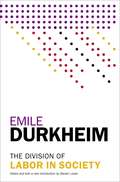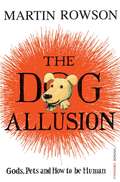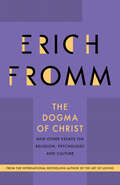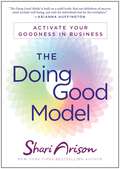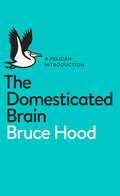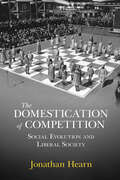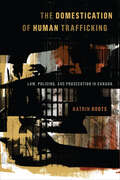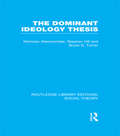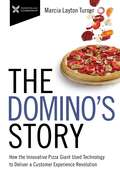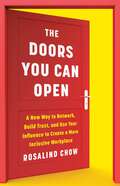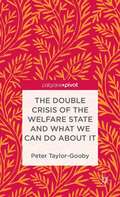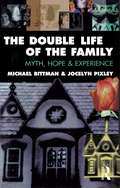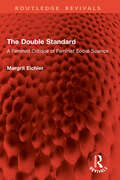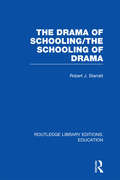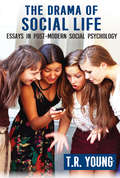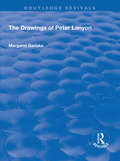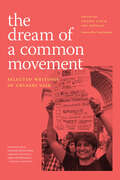- Table View
- List View
The Division of Labor in Society (Contemporary Social Theory Ser.)
by Emile DurkheimRevised for the first time in over thirty years, this edition of Emile Durkheim’s masterful work on the nature and scope of sociology is updated with a new introduction and improved translation by leading scholar Steven Lukes that puts Durkheim’s work into context for the twenty-first century reader.When it was originally published, The Division of Labor in Society was an entirely original work on the nature of labor and production as they were being shaped by the industrial revolution. Emile Durkheim’s seminal work studies the nature of social solidarity and explores the ties that bind one person to the next in order to hold society together.This revised and updated second edition fluently conveys Durkheim’s arguments for contemporary readers. Leading Durkheim scholar Steve Lukes’s new introduction builds upon Lewis Coser’s original—which places the work in its intellectual and historical context and pinpoints its central ideas and arguments. Lukes explains the text’s continued significance as a tool to think about and deal with problems that face us today. The original translation has been revised and reworked in order to make Durkheim’s arguments clearer and easier to read.The Division of Labor in Society is an essential resource for students and scholars hoping to deepen their understanding of one of the pioneering voices in modern sociology and twentieth-century social thought.
The Divorce Colony: How Women Revolutionized Marriage and Found Freedom on the American Frontier
by April White**SMITHSONIAN MAGAZINE, "10 BEST HISTORY BOOKS OF 2022"** **AMAZON, "BEST BOOK OF THE MONTH (Nonfiction)"** **APPLE, "BEST BOOK OF THE MONTH"** From a historian and senior editor at Atlas Obscura, a fascinating account of the daring nineteenth-century women who moved to South Dakota to divorce their husbands and start living on their own terms For a woman traveling without her husband in the late nineteenth century, there was only one reason to take the train all the way to Sioux Falls, South Dakota, one sure to garner disapproval from fellow passengers. On the American frontier, the new state offered a tempting freedom often difficult to obtain elsewhere: divorce. With the laxest divorce laws in the country, five railroad lines, and the finest hotel for hundreds of miles, the small city became the unexpected headquarters for unhappy spouses—infamous around the world as The Divorce Colony. These society divorcees put Sioux Falls at the center of a heated national debate over the future of American marriage. As clashes mounted in the country's gossip columns, church halls, courtrooms and even the White House, the women caught in the crosshairs in Sioux Falls geared up for a fight they didn't go looking for, a fight that was the only path to their freedom. In The Divorce Colony, writer and historian April White unveils the incredible social, political, and personal dramas that unfolded in Sioux Falls and reverberated around the country through the stories of four very different women: Maggie De Stuers, a descendent of the influential New York Astors whose divorce captivated the world; Mary Nevins Blaine, a daughter-in-law to a presidential hopeful with a vendetta against her meddling mother-in-law; Blanche Molineux, an aspiring actress escaping a husband she believed to be a murderer; and Flora Bigelow Dodge, a vivacious woman determined, against all odds, to obtain a "dignified" divorce. Entertaining, enlightening, and utterly feminist, The Divorce Colony is a rich, deeply researched tapestry of social history and human drama that reads like a novel. Amidst salacious newspaper headlines, juicy court documents, and high-profile cameos from the era's most well-known players, this story lays bare the journey of the turn-of-the-century socialites who took their lives into their own hands and reshaped the country's attitudes about marriage and divorce.
The Dog Allusion: Gods, Pets and How to be Human
by Martin Rowson'As with dogs, so with gods - by and large, you should blame the owners.'A particular trait, common to all human civilisations, is the worship of non-human entities with followings of devotees who claim that their reverence can transport them to transcendental heights of complete and unfettered love.Do we mean God? No - we mean Dog. Dogs and other pets we've been keeping and loving since we began walking on two feet. But why do we love God - and pets - so much when their capriciousness sometimes suggests that they don't love us back?In this wise, witty and highly topical book, celebrated cartoonist and novelist Martin Rowson argues that rationally, the whole enterprise of religion is a monumental and faintly ridiculous waste of time and money. But then again, so is pet-keeping.
The Dogma of Christ: And Other Essays on Religion, Psychology and Culture (Routledge Classics Ser.)
by Erich Fromm&“Fromm&’s developing thought merits the critical attention of all concerned with the human condition and its future.&” —The Washington Post The essays in this fascinating volume examine present-day psychological and cultural problems with the keen insight and humanistic sympathies characteristic of Erich Fromm&’s work.The Dogma of Christ provides some of the sharpest critical insights into how the contemporary world of human destructiveness and violence can no longer separate religion, psychology, and politics. The book brilliantly summarizes Fromm&’s ideas on how culture and society shape our behavior. &“It&’s the new post-religious theme song. The Fromm exhortations are imaginative and he has a definite audience.&” —Kirkus Reviews &“Of all the psychological theorists who have tried to formulate a system better than Freud&’s to approach problems of contemporary life, no one has been more creative or influential than Erich Fromm. He is the most articulate advocate on the role of social forces in molding our character and on our manner of relating to others. This volume is an expansion of his systematic doctrine.&” —Louis L. Lunsky, MD, Archives of Internal Medicine
The Doing Good Model: Activate Your Goodness in Business
by Shari ArisonThere is now proof that business and philanthropy form a powerful platform for positive change. Shari Arison has shown this through her leadership in over three decades of philanthropy and 15 years of running her own global business, the Arison Group. In her previous New York Times bestseller, Activate Your Goodness, Shari revealed the ways doing good enriches the lives of individuals and those around them. Now, in The Doing Good Model, Shari's vision and insights have been applied to the corporate world to illustrate how everyone benefits when companies value people and the planet alongside profit. Learning about the 13 values within The Doing Good Model will enable business owners to rethink their impact on every level, from the individual, all the way through to our collective well-being. The Doing Good Model is a guide that will enable you to infuse your business with the power of doing good. And more than that, it's a call to action for business owners, leaders, and employees in all industries across the world to become agents for change. Companies of any size can benefit from Shari's vision. Her sustainable values-based business model can easily be introduced and implemented in any organization. It's time to revitalize modern business for the good of humanity. Let The Doing Good Model open your eyes and become a catalyst for corporate transformation.
The Dollar: How the US Dollar Became a Popular Currency in Argentina (The Americas in the World Series)
by Ariel Wilkis Mariana LuzziOriginally published in Argentina in 2019 and now finally available in English, Luzzi and Wilkis&’s acclaimed book traces the history of the economic, social, and political relevance of the dollar in Argentina and its popularization over the years.How did the dollar come to play such a leading role in Argentina&’s national existence? How and why did this global currency become a local currency on the other end of the Western hemisphere? Through the reconstruction of the social and cultural history of the US dollar in Argentina, Luzzi and Wilkis provide original insight into this sidebar of the dollar&’s history, showing how it became a &“local&” currency even outside its country of origin.
The Domain of UX in Information Studies: Bridging Theories, Research, and Professional Practice (Synthesis Lectures on Information Concepts, Retrieval, and Services)
by Rong Tang Graham HerrliThis book bridges the gap between academic and applied User Experience (UX) research, offering a fresh perspective on uniting these two communities. Drawing from their extensive professional experience in both realms, the authors delve into the varying definitions, models, and methods that distinguish academic and applied UX practices. Through a thoughtful analysis of communication styles and research dissemination, the book highlights how the disconnect and differences hinder the progress in the UX field. More importantly, the authors emphasize the urgent need for greater integration between the academic and applied UX communities. To address this, the authors present a comprehensive framework for converging these perspectives, fostering collaboration and innovation. By bridging this divide, the book seeks to strengthen, advance, and empower the UX discipline, making it an essential resource for researchers, practitioners, and anyone invested in the future of UX. In addition, this book: Examines the concept of UX as defined in both academic and applied research settings, highlighting the gaps between the two Explains how inconsistent definitions, methods, and communication strategies hinder UX research progress Proposes actionable steps to bridge the gap between academic and applied UX, benefiting both communities
The Domestic Domain: Chances, Choices and Strategies of Family Households (Routledge Revivals)
by Anke Niehof Paul PennartzFirst published in 1999, the primary focus of this book is what goes on inside the ‘black box’ of households, beginning with decision-making but branching out to develop a comprehensive view of the domestic domain. It brings together theoretical frameworks relevant to the study of family households from several root disciplines, each framework highlighting a different approach. Each approach is applied to important problems concerning the functioning of family households. The book focuses on households and their members as active agents who manage both material and immaterial resources. The private sector, to which family households belong, is not viewed as just responding to impulses from the formal economy and to public policies, but as a dynamic system in its own right. In the view of Paul Pennartz and Anke Niehof, households not only accommodate to social change but also mediate and generate social change. In the book key studies are presented which exemplify approaches and issues. The key studies cover a wide range of societies in Europe, North and Latin America, Asia and Africa, thus also exemplifying the comparative perspective, which is another important feature of the book. Pennartz and Niehof examine issues including the organisational approach and resource allocation, the power approach and the division of household production tasks and the opportunity structure approach and the housing market.
The Domestic Servant in Eighteenth-Century England (Routledge Revivals)
by J. Jean HechtAlthough the importance of domestic servants in eighteenth-century England has long been recognized, The Domestic Servant in Eighteenth-Century England (first published in 1956, reviving the 1980 edition here) is the first attempt to investigate comprehensively what was the largest occupational group at that time. A wide variety of source material has been used—the diaries, memoirs, letters, magazines, newspapers and literary works, as well as pamphlets and treatises on social and economic problems of the day. A wealth of data has also been drawn from contemporary works on service, servants, and household management. The study is thus able to reconstruct the principal lineaments of the servant ‘class’ and to demonstrate the significance of the group in relation to the society of which it formed a part. Such aspects of the group as its composition, size and structure, the means by which it was recruited, the hopes and ambitions of its members, the nature of their social status, and the conditions under which they lived and laboured are all fully treated. The result of this thorough examination is a cogent work of sociological history.
The Domesticated Brain: A Pelican Introduction (Pelican Books)
by Bruce HoodWhat makes us social animals? Why do we behave the way we do?How does the brain influence our behaviour? The brain may have initially evolved to cope with a threatening world of beasts, limited food and adverse weather, but we now use it to navigate an equally unpredictable social landscape. In The Domesticated Brain, renowned psychologist Bruce Hood explores the relationship between the brain and social behaviour, looking for clues as to origins and operations of the mechanisms that keep us bound together. How do our brains enable us to live together, to raise children, and to learn and pass on information and culture? Combining social psychology with neuroscience, Hood provides an essential introduction to the hidden operations of the brain, and explores what makes us who we are.
The Domestication of Competition: Social Evolution and Liberal Society
by Jonathan HearnCompetition is deeply built into the structures of modern life. It can improve policies, products and services, but is also seen as a divisive burden that pits people against one another. This book seeks to go beyond such caricatures by advancing a new thesis about how competition came to shape our society. Jonathan Hearn argues that competition was 'domesticated', harnessed and institutionalised across a range of institutional spheres in the late eighteenth and early nineteenth centuries. Responding to crises in traditional forms of authority (hereditary, religious), the formalisation of competition in the economy, politics, and diverse new forms of knowledge creation provided a new mode for legitimating distributions of power in the emerging liberal societies. This insightful study aims to improve our ability to think critically about competition, by better understanding its integral role, for good and ill, in how liberal forms of society work.
The Domestication of Human Trafficking: Law, Policing, and Prosecution in Canada
by Katrin RootsHuman trafficking has emerged as one of the top international and domestic policy concerns, and is well covered and often sensationalized by the media. The nature of the topic combined with various international pressures has resulted in an array of government-led mandates to combat the issue. The Domestication of Human Trafficking examines Canada’s criminal justice approaches to human trafficking, with a particular focus on the ways in which the intersecting factors of race, class, gender, and sexuality impact practice. Using a wide range of qualitative and empirically grounded research methods, including extensive analysis of court documents, trial transcripts, and interviews with criminal justice actors, this book contributes to much-needed research that examines, specifies, and sometimes complicates the narratives of how trafficking works as a criminal offence. The Domestication of Human Trafficking turns our attention to the ways in which the offence of human trafficking is made on the front lines of criminal justice efforts in Canada.
The Dominant Ideology Thesis (Routledge Library Editions: Social Theory)
by Bryan S. Turner Nicholas Abercrombie Stephen HillAs a radical critique of theoretical sociological orthodoxy, The Dominant Ideology Thesis has generated controversy since first publication. It has also been widely accepted, however, as a major critical appraisal of one central theoretical concern within modern Marxism and an important contribution to the current debate about the functions of ideology in social life.
The Domino’s Story: How the Innovative Pizza Giant Used Technology to Deliver a Customer Experience Revolution (The Business Storybook Series)
by Marcia Layton TurnerImagine if you were there, taking notes, as a small pizza joint became one of the most successful restaurants in the world. The Domino’s Story will help you understand and adopt the competitive strategies, workplace culture, and business practices that made the iconic pizza chain the innovative restaurant and e-commerce leader it is today. <P><P>As one of the most technologically advanced fast-food chains in the market, Domino's has cemented their reputation for innovation, paved in industry-leading profits. In February 2018, according to Ad Age, Domino's unseated Pizza Hut to become the largest pizza seller worldwide in terms of sales. Rather than just tampering with a recipe that was working, they decided to think outside of the pizza box by creating digital tools that emphasized convenience and put the customer first. For the first time, the adaptable strategies behind the rise and dominance of Domino's are outlined in these pages. Through the story of the Domino's, you’ll learn: How to create meaningful innovation without changing the core of the product that people already love. How to recognize and take advantage of unique opportunities to alleviate your customers&’ pain points. How to grow a company by taking a holistic approach to the business. And, the importance of delivering a quality experience that will keep customers calling for more.
The Doors You Can Open: A New Way to Network, Build Trust, and Use Your Influence to Create a More Inclusive Workplace
by Rosalind Chow&“Chow revolutionizes our understanding of how careers advance&” (Daniel H. Pink, #1 New York Times best-selling author of Drive), taking readers on a transformative journey beyond the standard model of mentorship to embracing sponsorship. The way we currently network and engage in mentorship isn&’t working. Given the ever-evolving nature of the workplace, transactional networking and company-enforced mentorship programs simply don&’t help make our professional relationships more authentic or our workplaces more equitable. What we need instead is sponsorship. What&’s the difference between mentorship and sponsorship? Mentorship involves helping a mentee change their behavior, while sponsorship involves changing how other people see a protégé. Sponsorship is as important, if not more so, than mentorship in determining who gets ahead, making it a more effective way to promote social equality and inclusion in the workplace. In The Doors You Can Open, organizational expert Rosalind Chow shows readers that they likely already engage in sponsorship in their personal and professional networks—and how they can channel those skills to build more authentic professional relationships. We all have more agency and deeper networks to act as sponsors than we might think, and sponsoring others can lead to mutually beneficial lifelong connections rather than merely transactional interactions. Given the ever-evolving nature of the workplace, intentional and equitable sponsorship is more important now than ever for overturning traditional social hierarchies. Based on decades of original research, The Doors You Can Open makes a bold case for completely changing the way we network. Reading it will change how we see and use our relationships in the service of creating stronger workplaces for all.
The Double Crisis of the Welfare State and What We Can Do About It
by Peter Taylor-GoobyThe NHS, education, social care, local government, employment services, social housing and benefits for the poor face major challenges from a government determined to entrench a radical and divisive liberalism permanently in British public life. This book analyses the immediate challenges from headlong cuts that bear most heavily on women, families and the poor, and from a root-and-branch restructuring which will fragment and privatize the bulk of public services. It sets this in the context of escalating inequalities and the longer-term pressures from population ageing. It demonstrates that a more humane and generous welfare state that will build inclusiveness is possible by combining policies that limit child poverty, promote more equal outcomes from health care and education, introduce a greater contributory element into social benefits, invest in better child and elder care and address low wages and workplace rights. It analyses the political forces that can be marshalled to support these shifts and shows that, with political leadership, the welfare state can attract mass support.
The Double Life of the Family: Myth, hope and experience
by Jocelyn Pixley Michael BittmanThe modern family is under strain. What we crave most from our families is intimacy, warmth and self-fulfilment but we often find this difficult to achieve. We hold onto these expectations of our families even in the face of contradictory experiences, so the family sustains a double life. The authors explore the gap between our values, expectations and yearnings, and our experiences of everyday family life. Family ritual, political rhetoric, advertising images and television family sitcoms are all windows onto what we want and expect - our myths of the family. Yet our aspirations for intimacy and self-fulfilment are frustrated by unacknowledged inequalities between men and women, and parents and children. The inequalities have their origins in the division of domestic labour and in labour markets that disregard family responsibilities. The Double Life Of The Family argues that our expectations of family life are more powerful than is usually believed and have enormous influence on both the way governments structure social policy and on the decisions made by ordinary people.
The Double Standard: A Feminist Critique of Feminist Social Science (Routledge Revivals)
by Margrit EichlerFirst published in 1980, The Double Standard is a powerfully written book challenging the logic of much of the feminist literature in the social sciences. Although loyal to the tradition of feminist scholarship, Margaret Eichler argues that many feminist writers have unintentionally reinforced the sexual stereotypes that they seek to destroy, by using the wrong conceptual tools and the wrong language.The terms like ‘sex roles’ and ‘sex identity’ have been especially distorting because they are ambiguous, and in themselves become instruments of sexism. In both the language they employ and the explanations they offer, feminists must transcend sex as a criterion of social difference if they wish to overcome sexism in language and thought. This book argues that the double standard is the only relevant criterion for determining whether an identified sex difference is a matter of concern and not. (A double standard implies that two things which are the same are measured by different standards). Although usually employed in a strictly sexual sense the concept may be used for all types of behavior in which sex plays a role. The arguments of the book are controversial and provoking, but they sharpen the thinking of the feminist critique in a way that few other books have achieved. This is a must read for scholars and researchers or feminism, sociology of gender, and gender studies.
The Drag Queen Anthology: The Absolutely Fabulous but Flawlessly Customary World of Female Impersonators
by Lisa UnderwoodExamine the cultural and political implications of male-to-female gender performance! The Drag Queen Anthology: The Absolutely Fabulous but Flawlessly Customary World of Female Impersonators examines the phenomena of male-to-female gender performance and the people who live it. This provocative collection of original essays explores the possibilities, limitations, ironies, and controversies surrounding men who perform as women to an audience that knows the truth but celebrates the illusion. The book&’s contributors call on extensive backgrounds in sociology, anthropology, theater, literature-even military studies-and use a variety of approaches to address common themes and genres of presentation, performance, and style in a wide range of historical settings and cultures. The Drag Queen Anthology explores female impersonation in the past and present, addressing the often-contradictory cultural impulses found in the performance of femininity. The book examines the important issues of this unique form of gendering, including the cultural and sociopolitical implications of drag, the symbolic cultural ideals associated with women, the impact of the performer&’s social identities on his performance, and the reactions of the GLBT, straight, and feminist communities to drag. The book looks at traditional drag performance, challenges accepted perceptions about female impersonation, and exposes the notion of the effeminate drag queen as an outdated myth. The Drag Queen Anthology examines the important issues of male-to-female gender performance, including: how drag queen performance is used to attain situational status and power how drag queens challenge contemporary notions of gender what embodiment occurs when men undertake performances of femininity how drag queen performance is viewed as a theatrical presentation of self what representations of drag queens in film suggest about current gender relations why communities organize around drag queen performers how drag queen performance differs on-stage and off how male-to-female gendered performance intersects with performances of sexual identity, social class, race, age, and ethnicity The Drag Queen Anthology: The Absolutely Fabulous but Flawlessly Customary World of Female Impersonators is an indispensable resource on drag&’s core elements of performance and parody and how each affects contemporary notions of gender.
The Drama of Love and Death: A Study of Human Evolution and Transfiguration (Routledge Revivals: The Collected Works of Edward Carpenter)
by Edward CarpenterLove and Death are two major facets of the whole of human existence and in The Drama of Love and Death, Carpenter attempts to analyse the interplay of love and death in everyday life. Originally published in 1912, this study focuses on how love and death are perceived and treated in the history of humankind and how these views evolved up until the early twentieth century. This title will be of interest to students of Sociology and Anthropology.
The Drama of Schooling: The Schooling of Drama (Routledge Library Editions: Education)
by Robert J StarrattStarratt’s highly original book offers fresh insights into the nature of teaching, learning, schooling as a multi-cultural, social enterprise, and the importance of vision for that leadership—by using the analogy of drama. Schooling is a preparation to participate in the social drama, both as an individual and as a community. Beyond participation, schooling can enable youngsters to maintain and restore the human purposes of the social drama. This unique book accommodates present critics of schools from both the left and the right, but goes beyond them to offer a script for restoring the schools to their human and social purposes.
The Drama of Social Life: Essays in Post-modern Social Psychology
by T. R. YoungThese essays explore the many ways theater and dramaturgy are used to shape the everyday experience of people in mass societies. Young argues that technologies combine with the world of art, music, and cinema to shape consciousness as a commodity and to fragment social relations in the market as well as in religion and politics. He sees the central problem of post-modern society as how to live in a world constructed by human beings without nihilism on the one hand or repressive dogmatism on the other.Young argues that in advanced monopoly capitalism, dramaturgy has replaced coercion as the management tool of choice for the control of consumers, workers, voters and state functionaries. Young calls this process the "colonization of desire." Desire is colonized by the use of dramaturgy, mass media, and the various forms of art in order to generate consumers, vesting desire in ownership and display rather than in interpersonal relationships with profound consequence for marriage, kinship, friendship and community. While Young focuses his critique on capitalist societies undergoing great changes, he insists that the same developments are to be found in bureaucratically organized socialist societies.The Drama of Social Life is of interest to those who study theories of moral development, cultural studies, the uses of leisure, politics, or simply the uses of "make believe." It is intended for the informed lay public as much as for social psychologists.
The Drawings of Peter Lanyon
by Margaret GarlakeThis title was first published in 2003. Peter Lanyon stood at the forefront of landscape painting in Europe during the late 1950s and early 60s. A prominent St Ives artist, he was associated with Barbara Hepworth, Ben Nicholson and Naum Gabo; his work also has affinities with abstract expressionism. Lanyon's career started just as the study of drawing was being liberated from 19th-century academic constrictions. His many drawings range from records of trips to the Netherlands and Italy to portrait sketches and abstract studies. Lanyon also used drawings extensively in the development of some of his most important paintings. In this study, Margaret Garlake explores Lanyon's theory and practice of drawing; the contribution of drawings to the evocation of place in paintings; his use of models and the metamorphosis of the human body into landscape images, as well as his use of three-dimensional constructions as equivalents to drawing.
The Dream Revisited: Contemporary Debates About Housing, Segregation, and Opportunity
by Ellen Ingrid Gould Steil Justin PeterA half century after the Fair Housing Act, despite ongoing transformations of the geography of privilege and poverty, residential segregation by race and income continues to shape urban and suburban neighborhoods in the United States. Why do people live where they do? What explains segregation’s persistence? And why is addressing segregation so complicated?The Dream Revisited brings together a range of expert viewpoints on the causes and consequences of the nation’s separate and unequal living patterns. Leading scholars and practitioners, including civil rights advocates, affordable housing developers, elected officials, and fair housing lawyers, discuss the nature of and policy responses to residential segregation. Essays scrutinize the factors that sustain segregation, including persistent barriers to mobility and complex neighborhood preferences, and its consequences from health to home finance and from policing to politics. They debate how actively and in what ways the government should intervene in housing markets to foster integration. The book features timely analyses of issues such as school integration, mixed income housing, and responses to gentrification from a diversity of viewpoints. A probing examination of a deeply rooted problem, The Dream Revisited offers pressing insights into the changing face of urban inequality.
The Dream of a Common Movement: Selected Writings of Urvashi Vaid
by Urvashi VaidThe Dream of a Common Movement collects essays, interviews, and speeches by the late feminist and civil rights activist Urvashi Vaid, whose pioneering writing and organizing over the course of four decades fundamentally shaped the LGBTQ+ movement. Vaid explores the LGBTQ+ movement’s impact on the AIDS epidemic and its challenges as it developed a national presence. She calls out movement leaders and donors for not addressing gender, race, and class issues and passionately argues that the goal of any liberation movement should be transformation, not assimilation. In personal essays, Vaid describes a double consciousness forged by the experience of immigration and a complicated relationship with her Indian-American and lesbian identities. Whether she was focused on the Donors of Color Network, the 22nd Century Initiative, the Lesbian Political Action Committee, or other initiatives she launched, Vaid was steadfast in her vision of a more just society and believed deeply in the power of people coming together to effect change. Offering a window into the breadth of her progressive vision for social change, this volume inspires readers to never stop organizing and marching.
